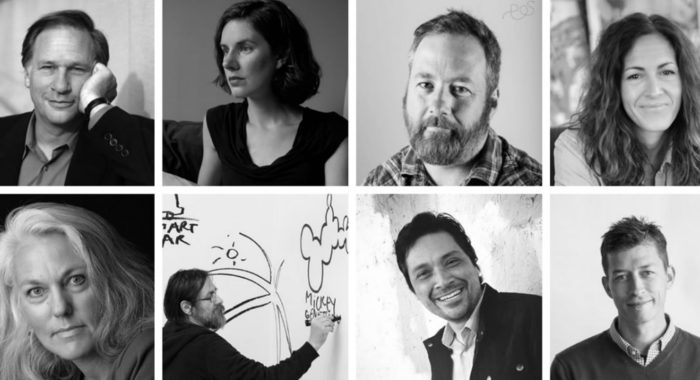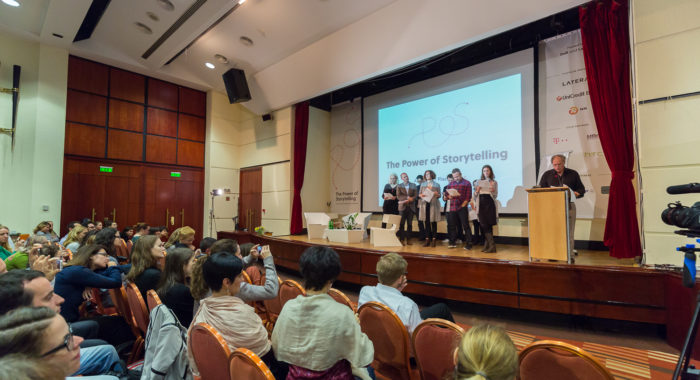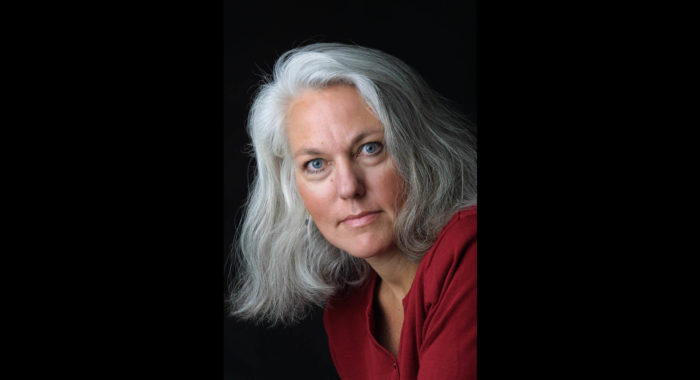“Jacqui, as many of you know, is a goddess” – that’s how people usually describe Jacqui Banaszynski, most recently during a podcast on the state of narrative journalism. We ourselves have called her many things over the years: “one of our dearest speakers”, “veteran coach” and, of course, “Fairy Godmother”. Here’s an update on the career of the journalism legend who’s been to seven of our eight editions so far, and is coming back this year.
Last year, Jacqui took over Nieman Storyboard – one of the three publications of the Nieman Foundation –, after decades of reporting, editing, teaching journalism and lecturing all over the world. The Nieman Foundation at Harvard University is probably the oldest journalism foundation in the US, and just celebrated its 80th anniversary last year. The website became a “teaching” resource, as Jacqui put it, that features posts on good storytelling, analyzes what certain authors did right and sometimes interviews them. To Jacqui, “it’s a community where people who believe in that type of journalism can gather and share lessons”.
It’s not like she had some extra-time on her hand. She’s also a faculty fellow at Poynter Institute in the US, delivers lectures at media conferences around the world, and just ended a long streak of teaching full-time at the Missouri School of Journalism. If you want to find out more about Jacqui’s envy-inducing career in journalism, how she reported from all seven continents or how she won the Pulitzer for a series about a gay couple dying of AIDS in 1980s’ America, read some of our past stories.
But Jacqui says Nieman has been really important in her life, especially when she became an editor and was looking for tools and inspiration to guide her along the way. So when the former editor left the website and her own teaching job at Missouri School of Journalism had come to an end, she was offered the job. “And I said «Oh, that’s a good way to not sit at home in my Barcalounger, in retirement, and watch Law & Order reruns all the time». It keeps me plugged in.”
And even though she’s invested in the project and loves sending out the weekly newsletter, she’d love not to be writing anything. “I want others to be doing that,” she said, encouraging writers to pitch articles. “The ideal story is if one journalist or student, or journalism professor, is interested in a story someone does, and they do an interview or write an analysis. And then I play editor.”
The other thing Jacqui’s been doing is traveling all over the world to deliver lectures and spread the storytelling gospel. The trend she’s been seeing lately in these events is a focus on digitization and social media, not necessarily on storytelling. She says the appetite to storytelling depends a lot on the countries she goes to. She’s found some interest for it in Romanian and Scandinavian newsrooms, but it recently occurred to her that it was almost strictly an American tradition. “Some countries are still hostile to it. I went to France two years ago with Tom French and they were not having it. They thought it was kind of low-brow journalism.”
Still, with traditional newspapers going downhill, she feels like the quality and frequency of online narrative journalism has improved over the years, and now investigative reporters, at least in the US, are curious to learn more about it. She sees this as a difficult moment, though, because of the loss of newsroom editors who knew how to teach storytelling and edit it – or “enterprise pieces”, as they’re called in the US –, the pace of daily journalism and the focus on metrics.
“So many newsrooms are just in love with metrics nowadays, and these kinds of stories don’t necessarily attract metrics, or not right away. They do it in ways you can’t necessarily measure,” Jacqui believes.
“There are no metrics that measure the impact on the human heart. So if all we do in some newsrooms is watch Chartbeat and worry about metrics, then these kinds of stories really have a hard fight in front of them. There’s no direct cause and effect between a story like this and readership. These stories find a way to get into people’s souls and hearts and DNA, and transform them a little bit, but I don’t know if they necessarily become clicks. I don’t know. I am not smart about metrics and I have bad attitudes about them.”
Get to know Jacqui Banaszynski’s work
- You can’t talk about Jacqui without mentioning she was a Pulitzer Prize finalist in 1986 (with a heartbreaking story about the Ethiopian famine) and then won the coveted award in 1988 for a three-part in-depth account of a gay couple dying of AIDS in the rural US.
- Don’t miss her past talks at The Power of Storytelling, on the importance of place in stories, on not letting gender define your dreams, how to hear true stories and how they reach people. They’ll show you the amount of wisdom and inspiration you can expect.
- Catch up on her stellar journalism career and her valuable reporting tips, including her famous Banaszynski beer rule.
- And definitely don’t pass on subscribing to the Nieman Storyboard newsletter, which she carefully puts together once a week.
Jacqui Banaszynski is speaking at the 9th edition of The Power of Storytelling. Register here to meet her and the other amazing speakers who will tackle this year’s theme: Heal.



